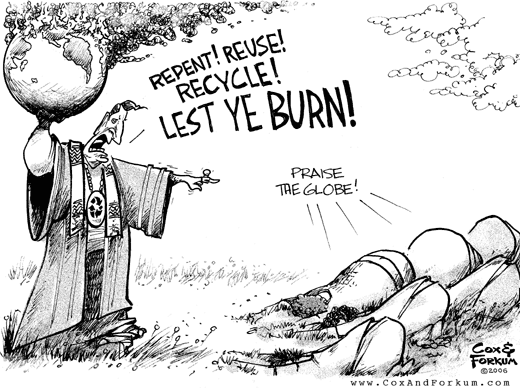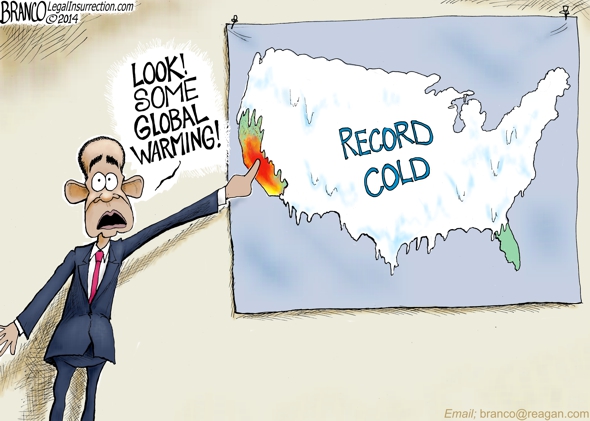Climategate--The Final Chapter
#831
Gets Weekends Off
Joined APC: Oct 2014
Position: Downward-Facing Dog Pose
Posts: 1,537
Let's let George Carlin have the last word on this:
https://www.youtube.com/watch?v=BB0aFPXr4n4
Common sense delivered with his typical flair.
https://www.youtube.com/watch?v=BB0aFPXr4n4
Common sense delivered with his typical flair.
^^^^^^^^Devastatingly, hilariously accurate.^^^^^^^^^

Nobody exposes the enviro-wacko nut-jobs for who & what they are as well as Carlin did.
#832
Gets Weekends Off
Joined APC: Nov 2010
Posts: 1,785
"I am not really terribly interested in global warming. Like most physicists I don't think much about it. But in 2008 I was in a panel here about global warming and I had to learn something about it. And I spent a day or so — half a day maybe on Google, and I was horrified by what I learned. And I'm going to try to explain to you why that was the case."
He also thinks that because the relationship between atmospheric CO2 and temperature in degrees Kelvin is not linear that it doesn't exist. Yikes.
I don't know what is funnier people citing this guy or George Carlin with regards to climate change. Who next? Kim Kardashian?
Climate Change: Vital Signs of the Planet: Consensus
#833
Gets Weekends Off
Joined APC: Nov 2010
Posts: 1,785
Mainau Declaration 2015 on Climate Change
We undersigned scientists, who have been awarded Nobel Prizes, have come to the shores of Lake Constance in southern Germany, to share insights with promising young researchers, who like us come from around the world. Nearly 60 years ago, here on Mainau, a similar gathering of Nobel Laureates in science issued a declaration of the dangers inherent in the newly found technology of nuclear weapons—a technology derived from advances in basic science. So far we have avoided nuclear war though the threat remains. We believe that our world today faces another threat of comparable magnitude.
Successive generations of scientists have helped create a more and more prosperous world. This prosperity has come at the cost of a rapid rise in the consumption of the world’s resources. If left unchecked, our ever-increasing demand for food, water, and energy will eventually overwhelm the Earth’s ability to satisfy humanity’s needs, and will lead to wholesale human tragedy. Already, scientists who study Earth’s climate are observing the impact of human activity.
In response to the possibility of human-induced climate change, the United Nations established the Intergovernmental Panel on Climate Change (IPCC) to provide the world’s leaders a summary of the current state of relevant scientific knowledge. While by no means perfect, we believe that the efforts that have led to the current IPCC Fifth Assessment Report represent the best source of information regarding the present state of knowledge on climate change. We say this not as experts in the field of climate change, but rather as a diverse group of scientists who have a deep respect for and understanding of the integrity of the scientific process.
Although there remains uncertainty as to the precise extent of climate change, the conclusions of the scientific community contained in the latest IPCC report are alarming, especially in the context of the identified risks of maintaining human prosperity in the face of greater than a 2°C rise in average global temperature. The report concludes that anthropogenic emissions of greenhouse gases are the likely cause of the current global warming of the Earth. Predictions from the range of climate models indicate that this warming will very likely increase the Earth’s temperature over the coming century by more than 2°C above its pre-industrial level unless dramatic reductions are made in anthropogenic emissions of greenhouse gases over the coming decades.
Based on the IPCC assessment, the world must make rapid progress towards lowering current and future greenhouse gas emissions to minimize the substantial risks of climate change. We believe that the nations of the world must take the opportunity at the United Nations Climate Change Conference in Paris in December 2015 to take decisive action to limit future global emissions. This endeavor will require the cooperation of all nations, whether developed or developing, and must be sustained into the future in accord with updated scientific assessments. Failure to act will subject future generations of humanity to unconscionable and unacceptable risk.
Mainau Island, Germany 3 July 2015
Nobel Laureate signatorees
Peter Agre Hiroshi Amano
J.M. Bishop David Baltimore
Elizabeth Blackburn Aaron Ciechanover
Martin Chalfie Elias Corey
Steven Chu Robert Curl
Claude Cohen-Tannoudji Johann Deisenhofer
James W. Cronin Sheldon Glashow
Peter Doherty Robert Grubbs
Gerhard Ertl Leland Hartwell
Edmond Fischer Dudley Herschbach
Walter Gilbert Roald Hoffmann
Roy Glauber Wolfgang Ketterle
David Gross Walter Kohn
John L. Hall Yuan T. Lee
Serge Haroche Michael Levitt
Stefan Hell John Mather
Jules H. Hoffmann Arthur B. McDonald
Klaus von Klitzing Edvard Moser
Harold Kroto May-Britt Moser
William Moerner Ryoji Noyori
Ferid Murad Paul Nurse
Ei-ichi Negishi John O'Keefe
Saul Perlmutter Douglas Osheroff
William Phillips Arno Penzias
Richard Roberts Carlo Rubbia
Kailash Satyarthi Oliver Smithies
Brian Schmidt Jack Steinberger
Hamilton O. Smith Thomas Steitz
George Smoot Horst Störmer
Jack Szostak Thomas Südhof
Roger Y. Tsien John Sulston
Harold Varmus Joseph H. Taylor
J. Robin Warren Carl Wieman
Arieh Warshel David Wineland
Torsten Wiesel
Robert Wilson
We undersigned scientists, who have been awarded Nobel Prizes, have come to the shores of Lake Constance in southern Germany, to share insights with promising young researchers, who like us come from around the world. Nearly 60 years ago, here on Mainau, a similar gathering of Nobel Laureates in science issued a declaration of the dangers inherent in the newly found technology of nuclear weapons—a technology derived from advances in basic science. So far we have avoided nuclear war though the threat remains. We believe that our world today faces another threat of comparable magnitude.
Successive generations of scientists have helped create a more and more prosperous world. This prosperity has come at the cost of a rapid rise in the consumption of the world’s resources. If left unchecked, our ever-increasing demand for food, water, and energy will eventually overwhelm the Earth’s ability to satisfy humanity’s needs, and will lead to wholesale human tragedy. Already, scientists who study Earth’s climate are observing the impact of human activity.
In response to the possibility of human-induced climate change, the United Nations established the Intergovernmental Panel on Climate Change (IPCC) to provide the world’s leaders a summary of the current state of relevant scientific knowledge. While by no means perfect, we believe that the efforts that have led to the current IPCC Fifth Assessment Report represent the best source of information regarding the present state of knowledge on climate change. We say this not as experts in the field of climate change, but rather as a diverse group of scientists who have a deep respect for and understanding of the integrity of the scientific process.
Although there remains uncertainty as to the precise extent of climate change, the conclusions of the scientific community contained in the latest IPCC report are alarming, especially in the context of the identified risks of maintaining human prosperity in the face of greater than a 2°C rise in average global temperature. The report concludes that anthropogenic emissions of greenhouse gases are the likely cause of the current global warming of the Earth. Predictions from the range of climate models indicate that this warming will very likely increase the Earth’s temperature over the coming century by more than 2°C above its pre-industrial level unless dramatic reductions are made in anthropogenic emissions of greenhouse gases over the coming decades.
Based on the IPCC assessment, the world must make rapid progress towards lowering current and future greenhouse gas emissions to minimize the substantial risks of climate change. We believe that the nations of the world must take the opportunity at the United Nations Climate Change Conference in Paris in December 2015 to take decisive action to limit future global emissions. This endeavor will require the cooperation of all nations, whether developed or developing, and must be sustained into the future in accord with updated scientific assessments. Failure to act will subject future generations of humanity to unconscionable and unacceptable risk.
Mainau Island, Germany 3 July 2015
Nobel Laureate signatorees
Peter Agre Hiroshi Amano
J.M. Bishop David Baltimore
Elizabeth Blackburn Aaron Ciechanover
Martin Chalfie Elias Corey
Steven Chu Robert Curl
Claude Cohen-Tannoudji Johann Deisenhofer
James W. Cronin Sheldon Glashow
Peter Doherty Robert Grubbs
Gerhard Ertl Leland Hartwell
Edmond Fischer Dudley Herschbach
Walter Gilbert Roald Hoffmann
Roy Glauber Wolfgang Ketterle
David Gross Walter Kohn
John L. Hall Yuan T. Lee
Serge Haroche Michael Levitt
Stefan Hell John Mather
Jules H. Hoffmann Arthur B. McDonald
Klaus von Klitzing Edvard Moser
Harold Kroto May-Britt Moser
William Moerner Ryoji Noyori
Ferid Murad Paul Nurse
Ei-ichi Negishi John O'Keefe
Saul Perlmutter Douglas Osheroff
William Phillips Arno Penzias
Richard Roberts Carlo Rubbia
Kailash Satyarthi Oliver Smithies
Brian Schmidt Jack Steinberger
Hamilton O. Smith Thomas Steitz
George Smoot Horst Störmer
Jack Szostak Thomas Südhof
Roger Y. Tsien John Sulston
Harold Varmus Joseph H. Taylor
J. Robin Warren Carl Wieman
Arieh Warshel David Wineland
Torsten Wiesel
Robert Wilson
#835
Celebrity activists often sabotage their own credibility. Arriving at a climate conference in a private jet is like arriving at a PETA convention in a mink coat. 

#840
Bracing for Fallacies
Joined APC: Jul 2007
Position: In favor of good things, not in favor of bad things
Posts: 3,543
Just saw this at Reason.com; "Liberals have other reasons to be leery. Sanders portrays climate change as "the single greatest threat facing our planet" even as he demands a ban on fracking. But the main reason the United States has been able to reduce carbon emissions in recent years is that we have replaced coal with natural gas—which has become more abundant thanks to fracking."
Thread
Thread Starter
Forum
Replies
Last Post









